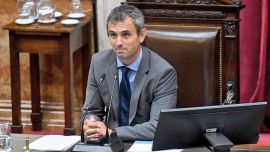The daily figures of confirmed coronavirus cases might still be in five digits and the deaths in three digits (levels which respectively took 81 and 42 days to reach since Covid-19 first arrived in Argentina), but after dominating the agenda for most of this year, pandemic and quarantine are as good as officially over as far as the government is concerned, or at least with a limited shelf life with vaccination just around the corner (even if there has been considerable fudging recently over exactly when). With the government finally falling into line with the quarantine fatigue felt by much of public opinion, a vacuum thus opens up in the public agenda and there was already plenty of jostling last week to fill it from both wings of the coalition government.
Congress was the chosen battleground for conflicting post-pandemic priorities with Peronist Militant Day last Tuesday the key date. On that day Frente de Todos caucus leader Máximo Kirchner could finally give birth to his controversial 'wealth tax over seven months after its conception while President Alberto Fernández donned a green tie to announce sending an abortion bill to Congress in a far less neutral tone than his predecessor Mauricio Macri two years ago. While the consistency of the presidential stance on this issue leaves no doubt as to his sincerity, the timing of this long delayed initiative is more open to suspicion – was Fernández thus seeking to replace the Kirchnerite parliamentary agenda with his own? Here the target might be not so much a wealth tax rejected across the private sector as the aggressive judicial priorities of his Vice-President Cristina Fernández de Kirchner, priorities not shared by the population at large nor by various sectors of the Frente de Todos coalition, not least the trade union spine of the Peronist movement.
But rather than a counter-offensive, the abortion proposal may also be seen as a purely defensive move to change the subject from last weekend’s letter to the International Monetary Fund (IMF) from Frente de Todos senators, with a Kirchnerite rejection of the IMF setting any policy conditions in the negotiations over repayment of the 2018 stand-by of US$44 billion, at odds with the constructive engagement and flexible tactics favoured by Economy Minister Martín Guzmán. This intransigence was, in turn, a reaction to multiplying signs of austerity such as the removal of all pandemic emergency wage and family income supplements from next year’s budget or a new pension updating mechanism lacking any index-linking to inflation as Guzmán seeks to slash the fiscal deficit by almost a half.
If the origins of the belated revival of abortion reform may be traced to that letter, so could the equally delayed approval of the wealth tax. If putting a lid on pensions, emergency relief and transport and utility bill subsidies is one half of hacking the fiscal deficit, boosting revenue is the other – the stiffening resistance to spending cuts was perhaps decisive in giving the green light to the new levy despite the misgivings of the government’s allies and moderate sectors.
Even if Senate approval will be a rubber stamping formality, these misgivings will not go away easily. Taking from the obscenely rich to give to the poor is beyond question a popular as well as populist idea which goes down well, not only in opinion polls but even with the IMF which does not care overmuch about the wherewithal to close the fiscal gap, least of all when eyeing Latin America’s extreme income inequalities from a global perspective. Yet this tax does not easily elude a dangerous context of pandemic and currency volatility creating a vast potential for all kinds of legal quagmires. Assets of 200 million pesos last December is the tax base but since then months of lockdown may have virtually liquidated them or so hammered them as to oblige the sale of productive plant while even where profit margins survive almost intact, the tax percentages will largely absorb them at the expense of investment.
Perhaps both this tax and the abortion bill were misconceived – perhaps the wealth levy should have been defined within the more general tax reform promised and long overdue while perhaps abortion reform, facing almost as uphill a battle in the Senate as two years ago, should be more properly put to a referendum (which could be adverse too). But whatever the destiny of these initiatives, we are moving towards a post-pandemic agenda, even ahead of seeing the last of the coronavirus.


















Comments